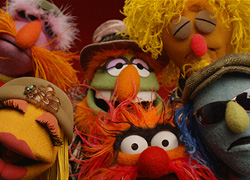A few more things about certain movies...
In Grown Ups, among those at the funeral of the coach are those who were on the team they had beaten in school. Why would they be at his funeral? They were a rival team/school, and if they were on a rival team. they wouldn't have gone to the same school and likely wouldn't have know the coach very well (unless any of them had attended that school at one point but went to a different school during that particular game). It's especially odd considering how disrespectful they seem, not to mention them still holding a grudge over losing because the leader believes Adam Sandler's character had stepped slightly over the line when making the winning shot.
I've talked about this in another thread, and had kinda got an answer, but am still puzzled... Throughout Ferris Beuller's Day Out, Jeanie tries to expose Ferris for skipping school, she eventually finds out somebody is in the house (unaware that it's Mr. Rooney), and calls the police, only to be arrested because Rooney had left by the time the police came. After going home, she sees Ferris walking by and tries to beat him home, even getting a ticket in the process... And yet when Rooney catches Ferris, she saves him, telling Mr. Rooney that he had walked home from the hospital in his condition, and then points out he left his wallet in the house and threw it. Somebody pointed out that in the commentary it's a case of "I can mess with my brother but you can't", but the principal wasn't messing with him, he was trying to catch him, Jeanie had wanted him to get caught as well, and more importantly, she had drove past the speed limit and got a ticket because she wanted him caught.
Also, she should have shown the wallet to her parents and the police so they'd know it wasn't a prank call. And what's with Mr. Rooney's reaction when she points out to him that he left his wallet? And she throws it and we hear a mean dog... What???
In A Christmas Carol, is the audience supposed to wonder why Scrooge isn't there in the future, or to suspect the dead person everybody is talking about is Scrooge? For years I thought they were talking about Tiny Tim, and in fact for a year after seeing The Muppet Christmas Carol (I'd seen a few other versions before but didn't really remember much) I didn't realize they were time traveling and was confused by Scrooge's name being on his tomb stone when he was obviously alive. And after he redeems himself, does he still die by the time of the future they traveled to, which couldn't be too many years into the future (as Tiny Tim's siblings don't look older, not do any of the Cratchets)?

 Welcome to the Muppet Central Forum!
Welcome to the Muppet Central Forum! Back to the Rock Season 2
Back to the Rock Season 2 Sesame Street Season 54
Sesame Street Season 54 The Muppets Mayhem premieres
The Muppets Mayhem premieres Bear arrives on Disney+
Bear arrives on Disney+ Sam and Friends Book
Sam and Friends Book